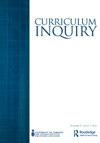废校之歌
IF 1.6
3区 教育学
Q2 EDUCATION & EDUCATIONAL RESEARCH
引用次数: 2
摘要
摘要在这篇文章中,我将学校废除理论化为在当前生态不稳定的时代扰乱教育所需的一种转变。作为一种实践和视野,废除通过将人性阐明为超越西方教育范式的集体表现,重新组织了学校教育的统治认识。由于种族资本主义学校教育产生了实施社会生态破坏的政治和经济主体,即使将学校逐步改革为社会公正的机构,也无法拯救地球。颠覆性的教育学和反叛性的课程现在是生存的必需品,学校的废除为建立解放性的替代方案提供了基础。在这篇文章中,我通过甘布斯的实验性M档案来考虑学校的废除,该档案基于三条相互关联的推测线。首先,我将学校教育和榨取理论化为两种相互关联的暴力形式,利用哈特曼、费雷拉·达席尔瓦和温特的作品,认为两者都构成了西方人文主义所必需的物质变革。其次,我认为学校的废除是气候灾难的自然后果,并借鉴巴特勒的播种者寓言来说明在生态不稳定的情况下学习和教授知识形式的重要性。第三,我推测音乐的作用,与乔丹的《Valentine Jones小姐的反击》合作,更多地思考集体和日常形式的学校废除。这些独特的线索通过它们对学校及其废除(dis)如何组织人类及其与环境关系的集体定义的描述而联系在一起。本文章由计算机程序翻译,如有差异,请以英文原文为准。
Songs of school abolition
Abstract In this article, I theorize school abolition as a shift needed to unsettle education within current times of ecological precarity. As a practice and horizon, abolition reorganizes schooling’s ruling episteme by articulating humanity as a collective performance beyond the pedagogical paradigms of western man. Because racial capitalist schooling produced the political and economic subjects enacting socioecological destruction, even a progressive reformation of the school into a socially just institution will not save the planet. Disruptive pedagogy and insurgent curriculum are now an existential necessity, and school abolition offers a foundation for building liberatory alternatives. In this article, I consider school abolition by way of Gumbs’s experimental M Archive, which grounds three interrelated lines of speculation. First, I theorize schooling and extraction as two interrelated forms of violence, utilizing the work of Hartman, Ferreira da Silva, and Wynter to argue that both constitute material transformations essential to western humanism. Second, I suggest that school abolition is a natural consequence of climate catastrophe, drawing on Butler’s Parable of the Sower to illustrate the importance of learning and teaching forms of knowledge while surviving ecological precarity. Third, I speculate on the role of music, working with Jordan’s “The Talking Back of Miss Valentine Jones” to think more about collective and everyday forms of school abolition. These unique threads are connected by their account of how school and its abolition (dis)organizes collective definitions of humanity and its relationship with the environment.
求助全文
通过发布文献求助,成功后即可免费获取论文全文。
去求助
来源期刊

Curriculum Inquiry
EDUCATION & EDUCATIONAL RESEARCH-
CiteScore
3.10
自引率
17.60%
发文量
37
期刊介绍:
Curriculum Inquiry is dedicated to the study of educational research, development, evaluation, and theory. This leading international journal brings together influential academics and researchers from a variety of disciplines around the world to provide expert commentary and lively debate. Articles explore important ideas, issues, trends, and problems in education, and each issue also includes provocative and critically analytical editorials covering topics such as curriculum development, educational policy, and teacher education.
 求助内容:
求助内容: 应助结果提醒方式:
应助结果提醒方式:


